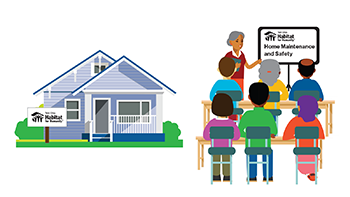Housing Market Shift: What Twin Cities Buyers Can Expect in 2025
Thinking about buying your first home in 2025? While your personal finances play a crucial role, external factors like mortgage rates, home...
3 min read
 Twin Cities Habitat for Humanity
:
2:36 PM on January 16, 2024
Twin Cities Habitat for Humanity
:
2:36 PM on January 16, 2024

Despite rising mortgage rates, high inflation, stock market volatility, and broader economic uncertainty, the housing market has shown remarkable resilience over the past year. As we look ahead to 2024, the market is expected to remain strong but with some shifting dynamics. Twin Cities Habitat for Humanity asked David Arbit, Director of Research and Economics at Minneapolis Area Realtors, to provide his expertise and insights on key factors that will shape the housing outlook for next year.
Despite lower transaction volume compared to the pandemic market, home prices have continued to increase at a steady clip. As David explains, “Sales and listings are lower, but prices are still high and rising. When mortgage rates spiked from 3–4% to around 7% earlier this year, most expected home prices to decline. However, prices have held steady and even continued to appreciate in many markets. May was the only month that saw lower home prices.”
This resilience has exceeded expectations. The housing market always skews one way or another. Right now, it’s skewing towards the $1m+ homes because these buyers are less sensitive to higher interest rates. Slowing demand among first-time homebuyers in the $300–400k range has been offset by trade-up buyers—those taking advantage of their home’s equity to upgrade to a larger home.
While the latest figures show a surprising increase in new listings, pending sales have seen a slight decline. Market fluctuations seem to be flattening, indicating a potential stabilization in demand. David noted, “We’re starting to see things flattening out. Declines in home sales have flattened. We’re finding the bottom in demand. Those who must move due to life changes such as new jobs, divorce, or growing families are moving. Those who want to move are staying put for a little longer.”
Homes are taking a similar amount of time to sell, with the number of days a home spends on the market showing a marginal decrease. Sellers are obtaining 97.5% of their original asking price, a slight decline from the peak in 2020 and 2021 at 100.2%.
In assessing economic headwinds that may impact housing in 2024, mortgage rates remain the most influential according to David. As he notes, “Rates and the economy are related. They’re co-dependent.”
It seems the Fed is pausing, but if job losses start to mount and economic growth contracts, the Fed may cut interest which would provide some relief to buyers. Given strong employment data thus far, however, major macroeconomic shifts seem unlikely in the near term. Barring an unforeseen shock, most economists anticipate a mild recession in early or mid-2024. The housing market has historically held up well during modest downturns. Sustained job growth and healthy consumer balance sheets provide underlying support.
The anticipation of changes in interest rates looms over the housing market, with 7% being considered relatively high.
These higher interest rates could tempt move-up buyers to rent out their current homes and use that rental income toward a new home. With the home being rented and not listed for sale, it creates a more inventory-neutral market. The advice for homebuyers is to carefully consider the impact of interest rate fluctuations on their potential purchase.
David shared, “People who buy now think they have an interest rate challenge. People who wait until spring will find they have a principal challenge. My advice is to marry the house but date the rate. Don’t feel afraid to lock into the house you love at a higher rate. You can always refinance later. Waiting for rates to drop means a greater chance at a bidding war—negating any savings a lower rate could have created.”
The current inventory situation is marked by an imbalance between supply and demand or buyer and seller activity. This imbalance, among other factors, is what drives housing prices higher. During the pandemic, there was a lot of demand for single-family suburban homes. Now, affordability concerns are leading to a shift in demand towards condos and townhomes. Current homeowners are choosing not to sell because they’re clinging to their locked-in rate and payment, and don’t want to trade up for a higher payment.
With existing homes not hitting the market, a lot of new buyers are looking toward new construction to overcome the supply shortage. This inventory crunch disproportionately impacts first-time buyers. Move-up buyers willing and able to stretch their budgets have continued to purchase homes at a steady pace.
Navigating the 2024 housing market will require both realism and creativity from buyers and sellers. As David advises, “Be ready to be flexible. Be willing to be creative when it comes to getting deals done.”
The road ahead is full of opportunities for those willing to learn and adapt. By sticking to sound principles, understanding unique market dynamics, and embracing flexibility, both existing and aspiring homeowners can secure that dream home despite the headwinds they may face.
Your gift unlocks bright futures! Donate now to create, preserve, and promote affordable homeownership in the Twin Cities.

Thinking about buying your first home in 2025? While your personal finances play a crucial role, external factors like mortgage rates, home...

Time to look into the real estate crystal ball (and look at some data) to make predictions about what the trends will be in the 2022 Twin Cities...

If you are planning to buy your first home in 2020, there is a lot to learn about the market! With a pandemic, recession, and social distancing...